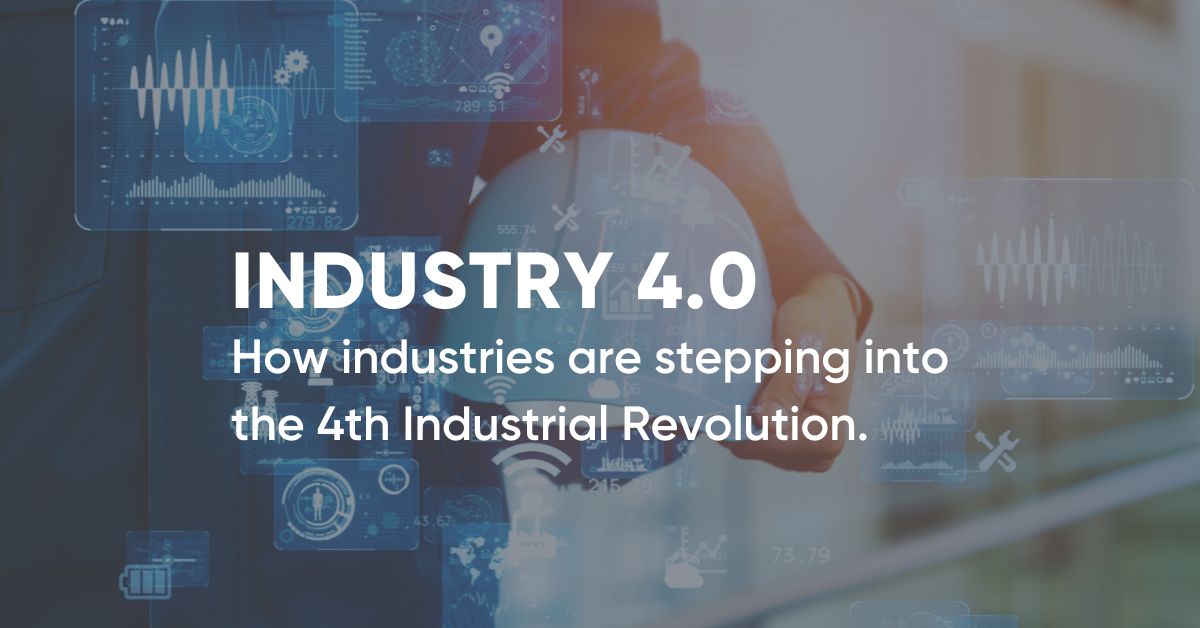Industry 4.0, also known as the Fourth Industrial Revolution, represents a significant shift in how industries operate and leverage technology. At its core, it is the integration of cutting-edge technologies like Artificial Intelligence (AI), the Internet of Things (IoT), big data analytics, and cloud computing into various industrial processes. This integration leads to a more connected, automated, and data-driven approach to production and decision-making.
The integration of these relatively new technologies can take many forms, and the number of use cases where these relatively new solutions can improve processes is expanding rapidly. Here are just a few real-world examples to better understand the impact of Industry 4.0 on various industries, and how you may be able to leverage these technologies in your work:
Manufacturing:
Industry 4.0 is revolutionizing manufacturing by accelerating the ability to create truly smart factories. In smart factories, machines and systems are interconnected and can communicate with each other autonomously. This enables real-time monitoring, predictive maintenance, and efficient production planning. For instance, in the automotive industry, smart factories can adjust production lines based on real-time demand, resulting in reduced waste and increased efficiency.
Many businesses are moving towards Closed-Loop Manufacturing, Closed-loop systems aim for circularity, fostering a sustainable and efficient flow of resources, hinging on continuous monitoring, analysis, and optimization of processes, creating an environment where real-time data becomes the guiding force for decision-making. Others are choosing Human-in-the-Loop Manufacturing, always having human intelligence available to oversee and contribute to critical decisions.
Retail:
In the retail sector, Industry 4.0 is enhancing the customer experience and optimizing supply chains. AI-powered chatbots and personalized recommendations are improving customer service. Additionally, RFID technology and IoT devices are being used to track inventory, reduce stockouts, and improve overall supply chain visibility. These innovations make shopping more convenient, efficient, and even more enjoyable for consumers.
Transportation:
The transportation industry is benefiting from Industry 4.0 through the implementation of autonomous vehicles and predictive maintenance. Self-driving cars and trucks can increase safety and reduce congestion on the roads. Predictive maintenance uses AI algorithms to forecast when vehicles and equipment need maintenance, reducing downtime and costs for transportation companies.
Supply Chain:
Real-time data from sensors and devices will enable companies to have better visibility into their supply chain, allowing for more accurate demand forecasting and inventory management. Smart factories will optimize production processes, reducing lead times and costs. Additionally, AI-driven algorithms will optimize route planning and logistics, leading to more efficient transportation and reduced carbon footprints. Overall, Industry 4.0 will enhance agility, resilience, and efficiency in supply chain operations, enabling businesses to better meet customer demands and stay competitive in an increasingly dynamic global market.
Utilities:
In utilities, Industry 4.0 is transforming the management of energy and resources. Smart grids and IoT sensors allow utilities to monitor and control energy distribution more efficiently. This leads to reduced energy waste, lower costs for consumers, and a greener environment.
With the integration of IoT sensors and devices, these inspections can now be conducted in a more automated and continuous manner. These sensors can monitor water quality, flow rates, and pipe conditions in real time, allowing for early detection of leaks, blockages, or corrosion. Artificial intelligence and machine learning algorithms can analyze the data collected, predicting potential issues and optimizing maintenance schedules. Drones and robotic devices equipped with cameras and sensors can navigate through pipes, providing visual inspections in hard-to-reach areas. Ultimately, Industry 4.0 will enhance the efficiency and effectiveness of wastewater pipe inspections, reducing the risk of environmental contamination and ensuring the reliability of crucial infrastructure.
The Positive Role of AI in Industry 4.0
Artificial Intelligence (AI) is undeniably the driving force behind Industry 4.0. AI algorithms can analyze vast amounts of data quickly, identify patterns, and make real-time decisions. This means better efficiency, cost savings, and improved decision-making across industries.
AI in Industry 4.0:
- Improved Efficiency: AI-driven automation streamlines processes, reducing human error and speeding up tasks. This leads to increased productivity and lower operational costs.
- Predictive Maintenance: AI can predict when equipment needs maintenance, preventing costly breakdowns and downtime.
- Enhanced Decision-Making: AI’s data analysis capabilities provide valuable insights, helping businesses make informed decisions and stay competitive.
- Personalization: AI can personalize products, services, and experiences for consumers, enhancing customer satisfaction.
- Job Creation: Contrary to the fear of job displacement, Industry 4.0 creates new roles related to AI development, data analysis, and system maintenance.
Industry 4.0 is not a distant future; it’s happening now, and it’s shaping a brighter, more efficient world across various industries. Embracing AI and advanced technologies in this new era can lead to remarkable improvements in production, customer experiences, and resource management. It may change the way we work, and change can be hard to manage. Despite the fear some feel around the changes from Industry 4.0, we should embrace them with optimism, as they hold the promise of a more innovative, sustainable, and prosperous future for all.

